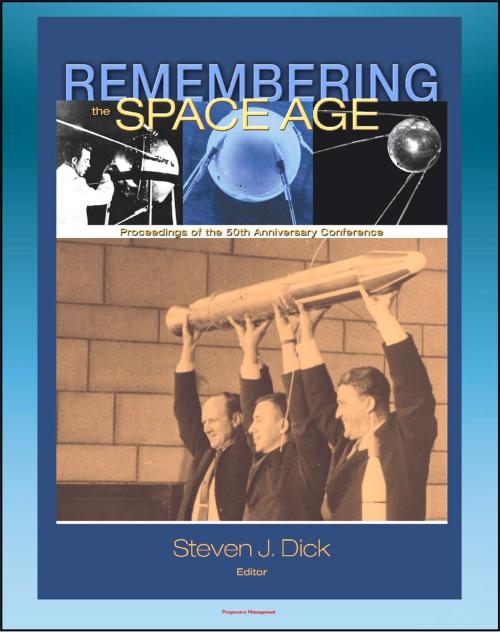Remembering the Space Age: Proceedings of the 50th Anniversary Conference - Germans and Nazis, Mythmaking in Russia, American Culture and Music, Heinlein Influence, Apollo, Chinese Program
Nonfiction, Science & Nature, Science, Physics, Astrophysics & Space Science, History, Americas| Author: | Progressive Management | ISBN: | 9781466020863 |
| Publisher: | Progressive Management | Publication: | February 4, 2012 |
| Imprint: | Smashwords Edition | Language: | English |
| Author: | Progressive Management |
| ISBN: | 9781466020863 |
| Publisher: | Progressive Management |
| Publication: | February 4, 2012 |
| Imprint: | Smashwords Edition |
| Language: | English |
This official NASA history document - converted for accurate flowing-text ebook format reproduction - contains twenty-one essays by noted experts on the history of the space age, with an eclectic selection of fascinating topics ranging from the effect of spaceflight on American music and culture to the role of Nazi Germans in the early days of the program.
Contents: PART I. National and Global Dimensions of the Space Age * Chapter 1: Gigantic Follies? Human Exploration and the Space Age in Long - term Historical Perspective — J. R. McNeill * Chapter 2: Spaceflight in the National Imagination — Asif A. Siddiqi * Chapter 3: Building Space Capability through European Regional Collaboration — John Krige * Chapter 4: Imagining an Aerospace Agency in the Atomic Age — Robert R. MacGregor * Chapter 5: Creating a Memory of the German Rocket Program for the Cold War — Michael J. Neufeld * Chapter 6: Operation Paperclip in Huntsville, Alabama — Monique Laney * Chapter 7: The Great Leap Upward: China's Human Spaceflight Program and Chinese National Identity — James R. Hansen * Chapter 8: "The 'Right' Stuff: The Reagan Revolution and the U.S. Space Program" — Andrew J. Butrica * Chapter 9: Great (Unfulfilled) Expectations: To Boldly Go Where No Social Scientist or Historian Has Gone Before — Jonathan Coopersmith * PART II. Remembrance and Cultural Representation of the Space Age * Chapter 10: Far Out: The Space Age in American Culture — Emily S. Rosenberg * Chapter 11: A Second Nature Rising: Spaceflight in an Era of Representation — Martin Collins * Chapter 12: Creating Memories: Myth, Identity, and Culture in the Russian Space Age — Slava Gerovitch * Chapter 13: The Music of Memory and Forgetting: Global Echoes of Sputnik II — Amy Nelson * Chapter 14: From the Cradle to the Grave: Cosmonaut Nostalgia in Soviet and Post - Soviet Film — Cathleen S. Lewis * Chapter 15: Examining the Iconic and Rediscovering the Photography of Space Exploration in Context to the History of Photography — Michael Soluri * Chapter 16: Robert A. Heinlein's Influence on Spaceflight — Robert G. Kennedy, Ill * Chapter 17: American Spaceflight History's Master Narrative and the Meaning of Memory — Roger D. Launius * PART III. Reflections on the Space Age * Chapter 18: A Melancholic Space Age Anniversary — Walter A. McDougall * Chapter 19: Has Space Development Made a Difference? — John Logsdon * Chapter 20: Has There Been a Space Age? — Sylvia Kraemer * Chapter 21: Cultural Functions of Space Exploration — Linda Billings
After 50 years of robotic and human spaceflight, and as serious plans are being implemented to return humans to the Moon and continue on to Mars, it is a good time to step back and ask questions that those in the heat of battle have had but little time to ask. What has the Space Age meant? What if the Space Age had never occurred? Has it been, and is it still, important for a creative society to explore space? How do we, and how should we, remember the Space Age?
It is with such questions in mind that the NASA History Division and the National Air and Space Museum Space History Division convened a conference on October 22-23, 2007, to contemplate some of the large questions associated with space exploration over the last half century. The conference was designed to discuss not so much the details of what has happened in space over the last 50 years, nor even so much the impact of what has happened, but rather its meaning in the broadest sense of the term. In doing so, the organizers made a conscious attempt to draw in scholars outside the usual circle of space history. This was not an easy task; we found that, with few exceptions, historians had not contemplated the meaning of the Space Age in the context of world history, even though the Space Age has given rise to an embryonic movement known as "big history" encompassing the last 13.7 billion years since the Big Bang.
This official NASA history document - converted for accurate flowing-text ebook format reproduction - contains twenty-one essays by noted experts on the history of the space age, with an eclectic selection of fascinating topics ranging from the effect of spaceflight on American music and culture to the role of Nazi Germans in the early days of the program.
Contents: PART I. National and Global Dimensions of the Space Age * Chapter 1: Gigantic Follies? Human Exploration and the Space Age in Long - term Historical Perspective — J. R. McNeill * Chapter 2: Spaceflight in the National Imagination — Asif A. Siddiqi * Chapter 3: Building Space Capability through European Regional Collaboration — John Krige * Chapter 4: Imagining an Aerospace Agency in the Atomic Age — Robert R. MacGregor * Chapter 5: Creating a Memory of the German Rocket Program for the Cold War — Michael J. Neufeld * Chapter 6: Operation Paperclip in Huntsville, Alabama — Monique Laney * Chapter 7: The Great Leap Upward: China's Human Spaceflight Program and Chinese National Identity — James R. Hansen * Chapter 8: "The 'Right' Stuff: The Reagan Revolution and the U.S. Space Program" — Andrew J. Butrica * Chapter 9: Great (Unfulfilled) Expectations: To Boldly Go Where No Social Scientist or Historian Has Gone Before — Jonathan Coopersmith * PART II. Remembrance and Cultural Representation of the Space Age * Chapter 10: Far Out: The Space Age in American Culture — Emily S. Rosenberg * Chapter 11: A Second Nature Rising: Spaceflight in an Era of Representation — Martin Collins * Chapter 12: Creating Memories: Myth, Identity, and Culture in the Russian Space Age — Slava Gerovitch * Chapter 13: The Music of Memory and Forgetting: Global Echoes of Sputnik II — Amy Nelson * Chapter 14: From the Cradle to the Grave: Cosmonaut Nostalgia in Soviet and Post - Soviet Film — Cathleen S. Lewis * Chapter 15: Examining the Iconic and Rediscovering the Photography of Space Exploration in Context to the History of Photography — Michael Soluri * Chapter 16: Robert A. Heinlein's Influence on Spaceflight — Robert G. Kennedy, Ill * Chapter 17: American Spaceflight History's Master Narrative and the Meaning of Memory — Roger D. Launius * PART III. Reflections on the Space Age * Chapter 18: A Melancholic Space Age Anniversary — Walter A. McDougall * Chapter 19: Has Space Development Made a Difference? — John Logsdon * Chapter 20: Has There Been a Space Age? — Sylvia Kraemer * Chapter 21: Cultural Functions of Space Exploration — Linda Billings
After 50 years of robotic and human spaceflight, and as serious plans are being implemented to return humans to the Moon and continue on to Mars, it is a good time to step back and ask questions that those in the heat of battle have had but little time to ask. What has the Space Age meant? What if the Space Age had never occurred? Has it been, and is it still, important for a creative society to explore space? How do we, and how should we, remember the Space Age?
It is with such questions in mind that the NASA History Division and the National Air and Space Museum Space History Division convened a conference on October 22-23, 2007, to contemplate some of the large questions associated with space exploration over the last half century. The conference was designed to discuss not so much the details of what has happened in space over the last 50 years, nor even so much the impact of what has happened, but rather its meaning in the broadest sense of the term. In doing so, the organizers made a conscious attempt to draw in scholars outside the usual circle of space history. This was not an easy task; we found that, with few exceptions, historians had not contemplated the meaning of the Space Age in the context of world history, even though the Space Age has given rise to an embryonic movement known as "big history" encompassing the last 13.7 billion years since the Big Bang.















